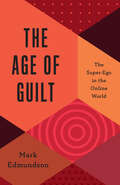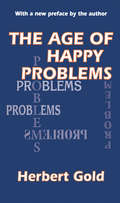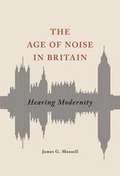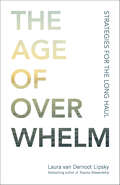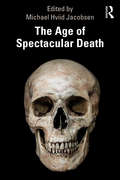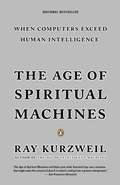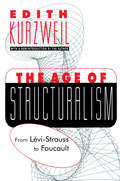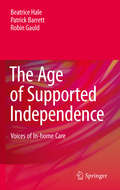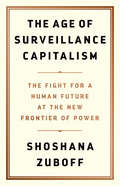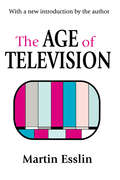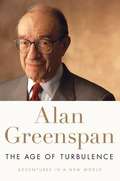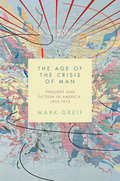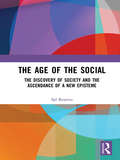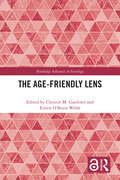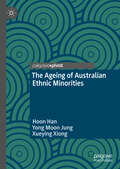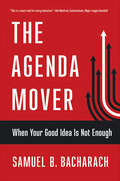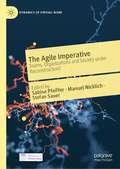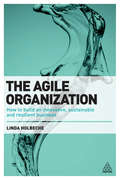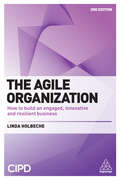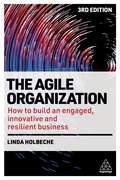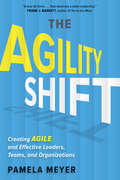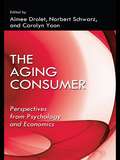- Table View
- List View
The Age of Guilt: The Super-Ego in the Online World
by Mark EdmundsonHow Freud&’s concept of the super-ego can help us to understand the harsh cultural climate of the digital age Cancellation, scapegoating, raving on Twitter. How did the Internet, which began as a place for open thought and exchange, become a forum for cruelty and judgment? Can a whole culture become mentally ill? How do we understand and respond to this problem? Mark Edmundson views contemporary culture and discourse through Freud&’s concept of the super-ego, the moralistic and frequently irrational inner judge. The poet William Blake was attuned to this &“dark pressure of self-condemnation,&” and Nietzsche knew its power as well. One way to mitigate (temporarily) the self-judgment of the super-ego is to aim it outward instead, judging and even punishing others for supposed infractions. Naturally these targets fight back, resulting in a cascade of bitterness and even hatred. Edmundson traces the destructive passion of the super-ego on politics, race, gender, class, education, and more, drawing on psychological studies, classroom experience, and the work of Adam Phillips and Slavoj Žižek. Edmundson proposes ways to manage the super-ego and even to transform it into an affirmative power. In The Age of Guilt, Edmundson renews the promise of Freudian theory as he explores our unique social moment with psychological insight, humanity, and erudition.
The Age of Happy Problems
by Herbert GoldIn his first book of non-fiction, originally published in 1962, Herbert Gold explores some not-so-happy problems confronting people in an age of "mass destruction, mass inertia, mass everything." While acknowledging that we live in a time of utmost global significance-war on an enormous scale was a reality of the twentieth century and continues to threaten, unadulterated evil has exhibited itself in grandiose proportions-Gold tackles issues and problems which are very much of significance to the individual: teaching, writing, love, marriage, divorce, and death. In The Age of Happy Problems, Gold takes the reader through a journey of eclectic characters, situations, and locales. Part I is a selection of essays entitled "American Events." In "The Age of Happy Problems" we are presented with an analysis of the problems facing people in the middle of their lives and careers. "How to Be an Artist's Wife" explores the prospect of being married, and remaining married, to a temperamental and egotistical artist. "Divorce as a Moral Act" describes the termination of marriage as a means for renewal and the chance to start over again the search for love. "The Bachelor's Dilemma" evokes the decisions confronting the male of the "big city." And "A Dog in Brooklyn, A Girl in Detroit: A L"ife Among the Humanities" is a memoir on the paradoxes of teaching in a university. Part II is entitled "American Places." The author examines in this section various American lifestyles. In "Paris: Notes from La Vie de Boheme," Gold describes Americans abroad, why they decide to become expatriates, and how they adapt to their new surroundings. In "Greenwich Village: The Changing Village" he writes about the importance of New York City's symbol of change, experiment and nonconformity. Finally, the author meditates on "Death in Miami Beach," offering a moving account of the relationship between death and the popular Florida city. Gold writes: "How can I total it up? What is the map of the map? Well, to begin with, Plato was wrong. The life of contemplation is not sufficient...and for another thing, Plato was right. He knew that men must learn to come together in the practice of intelligence and moral privilege." Gold's essays, stemming from the author's own humanity, are just as poignant and relevant today as they were when they were first published. The Age of Happy Problems is sure to captivate, but perhaps most of all, make the reader contemplate the importance of these issues for his or her own life.
The Age of Noise in Britain: Hearing Modernity
by James G MansellSound transformed British life in the "age of noise" between 1914 and 1945. The sonic maelstrom of mechanized society bred anger and anxiety and even led observers to forecast the end of civilization. The noise was, as James G. Mansell shows, modernity itself, expressed in aural form, with immense implications for the construction of the self. Tracing the ideas, feelings, and representations prompted by life in early twentieth century Britain, Mansell examines how and why sound shaped the self. He works at the crux of cultural and intellectual history, analyzing the meanings that were attached to different types of sound, who created these typologies and why, and how these meanings connected to debates about modernity. From traffic noise to air raids, everyday sounds elicited new ways of thinking about being modern. Each individual negotiated his or her own subjective meanings through hopes or fears for sound. As Mansell considers the different ways Britons heard their world, he reveals why we must take sound into account in our studies of cultural and social history.
The Age of Overwhelm: Strategies for the Long Haul
by Lauren van Dernoot LipskyThere is a growing epidemic afflicting people working in social change that is rarely talked about - burnout. Laura van Dernoot Lipsky, bestselling author of Trauma Stewardship, offers The Age of Overwhelm as the salve for healing. Whether we are overwhelmed by work or school; our families or communities; caretaking for others or ourselves; or engagement in social justice, environmental advocacy, or civil service, just a few subtle shifts can help sustain us. Laura van Dernoot Lipsky, bestselling author of Trauma Stewardship, shows us how by offering concrete strategies to help us mitigate harm, cultivate our ability to be decent and equitable, and act with integrity. The Age of Overwhelm aims to help ease our burden of overwhelm, restore our perspective, and give us strength to navigate what is yet to come.
The Age of Responsibility: Luck, Choice, and the Welfare State
by Yascha MounkYascha Mounk shows why a focus on personal responsibility is wrong and counterproductive: it distracts us from the larger economic forces determining aggregate outcomes, ignores what we owe fellow citizens regardless of their choices, and blinds us to key values such as the desire to live in a society of equals. In this book he proposes a remedy.
The Age of Spectacular Death
by Michael Hviid JacobsenThis book explores death in contemporary society – or more precisely, in the ‘spectacular age’ – by moving beyond classic studies of death that emphasised the importance of the death taboo and death denial to examine how we now ‘do’ death. Unfolding the notion of ‘spectacular death’ as characteristic of our modern approach to death and dying, it considers the new mediation or mediatisation of death and dying; the commercialisation of death as a ‘marketable commodity’ used to sell products, advance artistic expression or provoke curiosity; the re-ritualisation of death and the growth of new ways of finding meaning through commemorating the dead; the revolution of palliative care; and the specialisation surrounding death, particularly in relation to scholarship. Presenting a range of case studies that shed light on this new understanding of death in contemporary culture, The Age of Spectacular Death will appeal to scholars of sociology, cultural and media studies, psychology and anthropology with interests in death and dying.
The Age of Spiritual Machines: When Computers Exceed Human Intelligence
by Ray KurzweilRay Kurzweil is the inventor of the most innovative and compelling technology of our era, an international authority on artificial intelligence, and one of our greatest living visionaries. Now he offers a framework for envisioning the twenty-first century--an age in which the marriage of human sensitivity and artificial intelligence fundamentally alters and improves the way we live. Kurzweil's prophetic blueprint for the future takes us through the advances that inexorably result in computers exceeding the memory capacity and computational ability of the human brain by the year 2020 (with human-level capabilities not far behind); in relationships with automated personalities who will be our teachers, companions, and lovers; and in information fed straight into our brains along direct neural pathways. Optimistic and challenging, thought-provoking and engaging, The Age of Spiritual Machines is the ultimate guide on our road into the next century.
The Age of Spiritual Machines: When Computers Exceed Human Intelligence
by Ray KurzweilRay Kurzweil is the inventor of the most innovative and compelling technology of our era, an international authority on artificial intelligence, and one of our greatest living visionaries. Now he offers a framework for envisioning the twenty-first century--an age in which the marriage of human sensitivity and artificial intelligence fundamentally alters and improves the way we live. Kurzweil's prophetic blueprint for the future takes us through the advances that inexorably result in computers exceeding the memory capacity and computational ability of the human brain by the year 2020 (with human-level capabilities not far behind); in relationships with automated personalities who will be our teachers, companions, and lovers; and in information fed straight into our brains along direct neural pathways. Optimistic and challenging, thought-provoking and engaging, The Age of Spiritual Machines is the ultimate guide on our road into the next century.
The Age of Structuralism: From Levi-Strauss to Foucault
by Edith KurzweilStructuralism began in linguistics and was enlarged by Claude Levi-Strauss into a new way of thinking that views our world as consisting of relationships between structures we create rather than of objective realities. The Age of Structuralism examines the work of seven writers who either expanded upon or reacted against Levi-Strauss.In a panoramic overview of the origins of deconstructionism and its critics, Edith Kurzweil offers a lucid and penetrating portrait of the movement that dominated French intellectual life for much of the postwar era, and which continues to influence the French intellectual milieu. She explains Levi-Strauss's strikingly original contributions, then proceeds to illuminate the ideas of crusaders and critics. The key figures dealt with include: Louis Althusser, who reinterpreted Marxism through a rereading of Marx's texts with the help of structuralist techniques; Henri Lefebvre, who remained faithful to Marx's humanism and was one of the earliest and most vehement critics of structuralism; Paul Ricoeur, whose phenomenology sought to reconcile ethical theory and intellectual pursuits; Alain Touraine, a socialist whose sociology of political action led him to dismiss structuralist concerns; Jacques Lacan, who criticized ego-oriented psychoanalytic theory and practice, and whose own work emphasized linguistic structures in psychoanalysis; Roland Barthes, whose literary criticism, in its determination to reject all false notions and systems, led to a highly idiosyncratic approach that drew upon all systems; and finally, Michel Foucault, whose social histories of deviance, medicine, psychology, grammar, language, sexuality criminology, have reexamined every facet of social theory.Placing these major figures in the context of political, historical, and psychoanalytic currents of the time, The Age of Structuralism is a commanding and far-reaching study of a decisive epoch in intellectual history. Kurzweil's new opening essay explains how these towering figures prefigured current emphasis on semiotics, post-structuralism, deconstruction, and post-postmodernism. Kurt H. Wolff called it "lucid, splendid and unobtrusive" when the book first appeared. It remains a central work in the appreciation of the French giants upon whose shoulders the new crop of thinkers expect to stand.
The Age of Supported Independence
by Patrick Barrett Beatrice Hale Robin GauldThis book investigates the experiences of older people who remain at home with care. It examines the transition points for the important life changes faced by family members who take on a greater care-giving role. The book draws on demographic analyses and qualitative fieldwork to explore the shift from independence to increasing dependence, and suggests that this transition constitutes movement into a new stage of life, that of an Age of Supported Independence. Applying the anthropological concept of rites of passage in their analysis, the authors focus on the changes in everyday living within the spatial environment of the home, the temporal organization of daily life, and the reshaping of relationships. They suggest that many older people - as well as the family members who become carers - remain in a state of 'liminality': unable to make sense of their new situation and experience and, despite assumptions that ageing-in-place sustains social connectedness, excluded from their communities.
The Age of Surveillance Capitalism: The Fight for a Human Future at the New Frontier of Power
by Shoshana ZuboffThe challenges to humanity posed by the digital future, the first detailed examination of the unprecedented form of power called "surveillance capitalism," and the quest by powerful corporations to predict and control our behavior. <P><P>Shoshana Zuboff's interdisciplinary breadth and depth enable her to come to grips with the social, political, business, and technological meaning of the changes taking place in our time. We are at a critical juncture in the confrontation between the vast power of giant high-tech companies and government, the hidden economic logic of surveillance capitalism, and the propaganda of machine supremacy that threaten to shape and control human life. <P><P>Will the brazen new methods of social engineering and behavior modification threaten individual autonomy and democratic rights and introduce extreme new forms of social inequality? Or will the promise of the digital age be one of individual empowerment and democratization? <P><P>The Age of Surveillance Capitalism is neither a hand-wringing narrative of danger and decline nor a digital fairy tale. Rather, it offers a deeply reasoned and evocative examination of the contests over the next chapter of capitalism that will decide the meaning of information civilization in the twenty-first century. The stark issue at hand is whether we will be the masters of information and machines or its slaves.
The Age of Television
by Martin EsslinHaving spent most of his career working with the British Broadcasting Corporation (BBC), Martin Esslin appraises American TV with the eyes of both a detached outsider and a concerned insider. "American popular culture," writes Esslin, "has become the popular culture of the world at large. American television is thus more than a purely social phenomenon. It fascinates and in some instances frightens the whole world." The Age of Television discusses television as an essentially dramatic form of communication, pointing to the strengths and weaknesses that spring from its character. It explores its impact on generations destined to grow up under its influence, with such questions as how TV turns reality into fiction, and fiction into reality. Esslin considers the long-term effects of television on our abilities to reason, to read, to create. He asks if current programming on American television constitutes what we want and deserve, and asks what we would change, if we could. These are but a handful of the questions Esslin probes in this penetrating analysis of contemporary television and its impact on our lives. In his new introduction, Esslin discusses changes in the media over the last two decades. He explores the increasing number of television stations available, the rise of "boutique" channels concentrating on news, sports, or film, and the relationship between television and other forms of electronic media such as video games and the Internet. Finally, he considers the effect of these developments on our ability to concentrate, our sensitivity to violence, and even our artistic taste. Most compelling of all is his final question: Can the Age of Television, with all its dangers, yet become a golden age of cultural growth? Martin Esslin is professor emeritus of drama at Stanford University. His numerous critical works include: Brecht-The Man and his Work, The Theatre of the Absurd, An Anatomy of Drama, and Artaud. He cur
The Age of Turbulence: Adventures in a New World
by Alan GreenspanAutobiography of the Chairman of the Federal Reserve Board, along with his analysis of the emerging global economy.
The Age of the Crisis of Man: Thought and Fiction in America, 1933–1973
by Mark GreifIn a midcentury American cultural episode forgotten today, intellectuals of all schools shared a belief that human nature was under threat. The immediate result was a glut of dense, abstract books on the "nature of man." But the dawning "age of the crisis of man," as Mark Greif calls it, was far more than a historical curiosity. In this ambitious intellectual and literary history, Greif recovers this lost line of thought to show how it influenced society, politics, and culture before, during, and long after World War II. During the 1930s and 1940s, fears of the barbarization of humanity energized New York intellectuals, Chicago protoconservatives, European Jewish émigrés, and native-born bohemians to seek "re-enlightenment," a new philosophical account of human nature and history. After the war this effort diffused, leading to a rebirth of modern human rights and a new power for the literary arts.Critics' predictions of a "death of the novel" challenged writers to invest bloodless questions of human nature with flesh and detail. Hemingway, Faulkner, and Richard Wright wrote flawed novels of abstract man. Succeeding them, Ralph Ellison, Saul Bellow, Flannery O'Connor, and Thomas Pynchon constituted a new guard who tested philosophical questions against social realities--race, religious faith, and the rise of technology--that kept difference and diversity alive.By the 1960s, the idea of "universal man" gave way to moral antihumanism, as new sensibilities and social movements transformed what had come before. Greif's reframing of a foundational debate takes us beyond old antagonisms into a new future, and gives a prehistory to the fractures of our own era.
The Age of the Social: The Discovery of Society and The Ascendance of a New Episteme
by Sal RestivoThe concept of society sui generis – society as a level of reality which could be studied scientifically – crystallized in the middle of the nineteenth century in Europe, with the work of Durkheim, Marx and Weber and today, more than at any other period in history, the idea of the social has gained a foothold in philosophy, biology, and neuroscience. However, this idea has emerged into prominence not through the historical or contemporary efforts of sociologists, but mainly through the efforts of biologists and neuroscientists. This book seeks to re-establish the credentials of sociology as the science of society. While acknowledging the amalgamation of traditional disciplines into interdisciplinary and multidisciplinary networks of research and theory, and championing interdisciplinarity in recognising the capacity of converging perspectives to yield more interesting general theories of social life, the author defends disciplinarity in maintaining sociology’s achievements as a discipline. With chapters on the sociological world view, imagining society, the self, love, education, mathematics and religion, The Age of the Social re-states the importance of sociology as the source of robust ideas about the social in an age in which this notion has grown in importance. As such, it will appeal to scholars across the social sciences, with interests in method and philosophy in the social disciplines.
The Age-friendly Lens (Routledge Advances in Sociology)
by Christie M. GardinerThis book engages with the concept of age-friendly environments, adopting multi-perspectivity to demonstrate how age-friendly environments can contribute to shifting how we think, feel and act toward issues of age and ageing and operate as a vehicle to improve understandings of ageism. Drawing from traditionally distinct fields, the text demonstrates theoretical and applied dimensions of the age-friendly global agenda, with several chapters discussing topics that have to date been underrepresented in age-friendly scholarship, including education, health and justice systems. The case studies encourage critical engagement with the issue of ageism in age-friendly scholarship. It presents a clear understanding of the inequalities, challenges and opportunities of ageing and of the ways international, regional, national and sub-national commitments in health, development and human rights, and are further impacted by, ageing through designing, implementing, monitoring and evaluating policies and programmes. The essays utilise a critical and interdisciplinary dialogue to enhance discussion of the age-friendly environment agenda through the inclusion of age-friendly perspectives in addition to its processes and destinations in an ageing society. The book serves as a catalyst to stimulate research, policy and public interest in the physical, social and regulatory environments in which we age and the consequent impact upon health and well-being. It will be of interest to professors, graduate students and undergraduate students in policy, sociology, health, planning and gerontology. It is also recommended reading for policy makers, politicians, think tanks and lobbyists, who are concerned with age all-age-inclusiveness.
The Age-friendly Lens (Routledge Advances in Sociology)
by Christie M. GardinerThis book engages with the concept of age-friendly environments, adopting multi-perspectivity to demonstrate how age-friendly environments can contribute to shifting how we think, feel and act toward issues of age and ageing and operate as a vehicle to improve understandings of ageism. Drawing from traditionally distinct fields, the text demonstrates theoretical and applied dimensions of the age-friendly global agenda, with several chapters discussing topics that have to date been underrepresented in age-friendly scholarship, including education, health and justice systems. The case studies encourage critical engagement with the issue of ageism in age-friendly scholarship. It presents a clear understanding of the inequalities, challenges and opportunities of ageing and of the ways international, regional, national and sub-national commitments in health, development and human rights, and are further impacted by, ageing through designing, implementing, monitoring and evaluating policies and programmes. The essays utilise a critical and interdisciplinary dialogue to enhance discussion of the age-friendly environment agenda through the inclusion of age-friendly perspectives in addition to its processes and destinations in an ageing society.The book serves as a catalyst to stimulate research, policy and public interest in the physical, social and regulatory environments in which we age and the consequent impact upon health and well-being. It will be of interest to professors, graduate students and undergraduate students in policy, sociology, health, planning and gerontology. It is also recommended reading for policy makers, politicians, think tanks and lobbyists, who are concerned with age all-age-inclusiveness.
The Ageing of Australian Ethnic Minorities
by Hoon Han Yong Moon Jung Xueying XiongThis chapter introduces ageing-related issues that are of paramount significance on the global scale as the world embarks on becoming an ageing society. Population ageing—the increasing proportion of aged people in the population—is challenging many countries worldwide. Specifically, two research questions for the book are proposed: (1) What is the extent of the quality of life and intersectionality of ageing and having a culturally and linguistically diverse (CALD) background in Australia? (2) What are the preferred lifestyle choices and the constraints or opportunities that older people from CALD backgrounds encounter in Australia in later life? This chapter reviews three broad processes of an ageing society, including population ageing, globalisation, and migration, and identifies the research gap in quality of life, housing and location choices, and intergenerational transfer for elderly people from CALD backgrounds. Research methods and survey design are elaborated in this chapter.
The Agenda Mover: When Your Good Idea Is Not Enough
by Samuel B. BacharachEveryone is capable of coming up with a good idea, but a good idea without execution is hallucination. Leaders, including politicians and corporate officers, are those who have mastered the pragmatic skills that turn creative, innovative ideas into concrete realities. They are able to transform promises into results. The Agenda Mover leads you on the journey from having a good idea to bringing it to fruition. You will master the political competence to assure that your ideas gain momentum and achieve true traction. You will learn what it takes to go the distance to sustain your campaign and achieve your goals. Rather than dreaming about what could happen, you will become an agenda mover who gets things done and makes things happen.
The Agile Imperative: Teams, Organizations and Society under Reconstruction? (Dynamics of Virtual Work)
by Sabine Pfeiffer Stefan Sauer Manuel NicklichIn an ever-changing working environment, customer and workplace demands have brought new challenges to how we organize and manage work. Increasingly, this is addressed by the idea of 'agility.' From its beginning, agile work has claimed to be a radically different approach which allows organisations to react flexibly to changing environmental demands whilst also offering a ‘people' centered approach to management.While the literature often examines agile instruments from a business perspective, this edited collection advances the discussion of the efficacy of agile working, by applying a more critical social science perspective.The chapters scrutinize whether agility is just a discursive imperative, or whether it is in fact a genuine organizational and institutional strategy that is meant to better deal with complexity and volatility. The answers to these questions can vary at different levels, and the editors therefore examine agility at the level of teams, organizations and societies. By assembling different perspectives on the sustainability and virtue of agile instruments, and by bringing together international scholars from a variety of disciplines, the project stimulates a comparative discussion.
The Agile Organization
by Linda Holbeche“Agility” is the ability to continuously adapt to rapidly changing circumstances, while “resilience” is being able to bounce back from setbacks. Resilience is essential if a company’s benefits are to endure in the long run and if their employees’ loyalty is to be kept. The Agile Organization focuses on how to build both agility and resilience at individual, team, and organizational levels. Author Linda Holbeche puts the process of developing agile strategy, structures, and processes into the big picture context. This book provides OD/HR practitioners with ways to be effective in a 24/7 business culture, to recognize and avoid the pitfalls of achieving agility without also building organizational resilience, and to understand the importance of involving people in transforming organizations for greater agility. Combining case studies, self-assessment tools, guidelines, and practical checklists with theory, Holbeche explains how to achieve organizational agility while also maintaining and enhancing employee engagement and resilience.
The Agile Organization: How to Build an Engaged, Innovative and Resilient Business
by Linda HolbecheIn today's volatile and ambiguous world, organizations need to have the capacity and flexibility to respond rapidly to changes in their environment, both internally and externally. The key to retaining this competitive advantage is agility, a set of capabilities that help organizations adapt with the full co-operation of their employees. Packed with helpful checklists, tips and advice, The Agile Organization is a practical blueprint to building both agility and resilience at individual, team and organizational levels. This revised second edition of The Agile Organization contains a new chapter on the latest approaches to agile organization design in light of digitization and customer-centricity, as well as new and updated case studies from the University of California, Berkeley, the UK National Health Service (NHS), SNC-Lavalin's Atkins business and General Electric (GE). It remains the 'go to' guide for HR and OD specialists, senior leaders and managers who want to help bring about organizational transformation and build a sustainably agile business while enhancing employee engagement and resilience.
The Agile Organization: How to Build an Engaged, Innovative and Resilient Business
by Linda HolbecheThe key to retaining competitive advantage in a volatile business world is agility. The third edition of The Agile Organization shows how to develop capabilities across the organization to adapt.With helpful checklists, tips and advice, this is a practical blueprint to building both agility and resilience at individual, team and organizational levels. It covers how to design agile organizations as well as how to implement agile models into existing organizations and people practices. There is guidance on how agility can be applied to talent management, flexible working patterns and the importance of mobilizing and energizing employees for change.This edition contains new material on agile mindsets and enterprise agile planning, alongside how hybrid forms of working can enhance resilience. There is also extended material on how inclusion and wellbeing initiatives can support individual resilience and innovation to improve performance across the organization. Case studies include ING, the University of California, Berkeley, the UK National Health Service (NHS) and SNC-Lavalin's Atkins business. This book is an essential read for HR and OD specialists, senior leaders and managers who want transform their organization and build an agile business.
The Agility Shift: Creating Agile and Effective Leaders, Teams, and Organizations
by Pamela MeyerAs contrary as it sounds, "planning" -- as we traditionally understand the term--can be the worst thing a company can do. Consider that volatile weather events disrupt trusted supply chains, markets, and promised delivery schedules. Ever-shifting geo-political tensions, as well as internal political upheaval within U.S. and global governments, derail long-planned new ventures. Technology failures block opportunities. Competitors suddenly change their product or release date; your team cannot meet the pace of innovations in your market niche, leaving you sidelined. There are myriad ways in the current business environment for a company's well-considered business plans to go awry. Most business schools continue to prepare managers to be effective in stable and predictable environments, conditions that, if they ever existed at all, are long gone. The Agility Shift shows business leaders exactly how to make the radical mindset and strategy shift necessary to create an agile, entrepreneurial organization that can innovate and thrive in complex, ever-changing contexts. As author Pamela Meyer explains, there is much more involved than a reconfiguration of the org chart and job descriptions. It requires relinquishing the illusion of control at the very foundation of most management training and business practice. Despite most leader's approaches, "Agility is not simply accelerated planning." Unlike many agility books on the market, The Agility Shift provides specific, actionable strategies and tactics for leaders at all levels of the organization to put into practice immediately to improve agility and achieve results.
The Aging Consumer: Perspectives From Psychology and Economics (Marketing and Consumer Psychology Series)
by Norbert Schwarz Aimee Drolet Carolyn YoonAt present, about 45 million Americans are over the age of 65, and by 2020, one out of every six Americans will be 65 or older. These statistics are reflective of a worldwide phenomenon in developing and developed countries alike unrivalled since the Industrial Revolution. This edited volume, written by experts in many fields, examines the economic and psychological research on how aging consumers behave, make decisions, and choose in the marketplace. The book takes stock of what is known, identifies gaps and open questions, and outlines an agenda for future research. It covers topics from the individual to the societal level of analysis.
